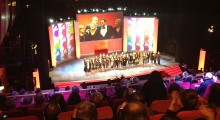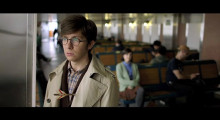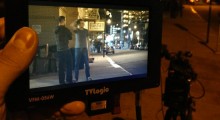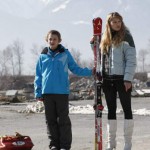Lighting
-
Festival Cinematography Notes – At Berlin, Back to Black

Back in February, I had the privilege of giving two workshops, “Intro to Large-sensor Digital Cinema Cameras” and “Large-sensor Digital Cinema Cameras in Detail” at the 11th edition of the Berlinale Talent Campus. For those not acquainted with this Berlin Film Festival initiative: the Talent Campus each year invites 300 directors, producers, editors, and cinematographers – “talented emerging filmmakers in the first years of their career” – each with a film or two under their belts. Most seem to be in their late 20s. This year over 4,400 applied from 137 countries. Clearly a hot ticket. The 300 lucky ones […]
by David Leitner on Mar 27, 2013 -
Oscar-Nominated Cinematographers Discuss Filmmaking

The problem with the Oscars is that you spend three hours watching the show and at the end you haven’t learned anything from the winners about how they did what they did. In celebration of the event, and with congratulations to the winners, here’s some interviews with the nominees for Best Cinematography. One of the interesting themes you’ll note in these articles is that the switch from film to digital remains a hot topic: Anna Karenina | Seamus McGarvey “Anna Karenina was filmed with anamorphic lenses, which require slightly more light, and some of the lighting used is older in style, […]
by Michael Murie on Feb 25, 2013 -
Shooting the Short BART: an Interview with the Director and DP

When L.A.-based director Rich Landes was offered the chance to shoot a short narrative piece for Canon he jumped at the chance. Landes has extensive experience as a commercial director, but this was a chance to direct a narrative based on his own idea, and with few restrictions from the “client.” But first he had to come up with an idea and treatment in two days. Then he had to fly to New York and cast, find locations, and hire a DP in four days, and then shoot the whole thing over the course of two days. None of this […]
by Michael Murie on Jan 15, 2013 -
Game Changers Part 4: Planning and Shooting

In this fourth episode of a series on the making of the low-budget independent film, Game Changers, director Rob Imbs and cinematographer Benjamin Eckstien discuss audio recording, communication between director and cinematographer, and how to plan out shooting a multi-day, multi-location project. Earlier parts consisted of an overview and then discussed fundraising, casting, camera and lighting gear. Filmmaker: What is the size of your crew? Eckstein: We typically have two people in our sound department every day, though there were some scenes or times of day where we had one person. We typically had an AC and another PA. On […]
by Michael Murie on Dec 4, 2012 -
Game Changers Part 3: Camera and Lighting

In this third part of the series about the production of the low-budget indie movie Game Changers, filmmakers Rob Imbs (director) and Benjamin Eckstein (cinematographer) discuss shooting with the Sony PMW-F3, shooting in S-Log, lighting issues, and the lenses used to shoot the movie. Filmmaker: Ben, you already owned the Sony PMW-F3, was the decision simply to use the camera you had? Eckstein: I’ve been fortunate that I own almost all the gear that I use on a day-to-day basis. From the beginning when talking to Rob, it was not really a discussion of “Are you trying to get the […]
by Michael Murie on Nov 9, 2012 -
Ursula Meier and Agnes Godard on Sister

Switzerland’s submission for the best international picture is Ursula Meier’s Sister, starring the stunning and earthy Léa Seydoux as a Swiss hot mess and Kacey Mottet Klein as her weedy 12-year-old brother who supports them both through petty thefts. It’s a subtle, complex film that avoids obvious polarities of class, family, even landscape. As director Meier said to me recently of the mountain resort setting, and about finding her way into the script by focusing on the location of the ski lift cable cars, “It’s the place where he belongs, between two worlds. And it’s also the rhythm of the […]
by Miriam Bale on Oct 5, 2012 -
Shooting Diary: Sean Meehan on Shooting in Small Spaces
When D.P. Sean Meehan went to college he was undecided about what he would study. But in his first semester he took an American Film studies class and it prompted him to call his parents two weeks into school and say, “I’m sorry, I’m going to be a film major.” He then spent all his time turning Boston College’s film department into “my own mini film production major.” He took as many classes as possible and also did side projects to learn about the filmmaking process. Only graduating in 2011, Sean’s already freelancing regularly for a variety of clients. I […]
by Michael Murie on Sep 24, 2012 -
Color Enhancements
by Roberto Quezada-Dardon on Oct 25, 2010
Roberto Quezada-Dardon learns why digital intermediate has become an essential tool for filmmakers.







